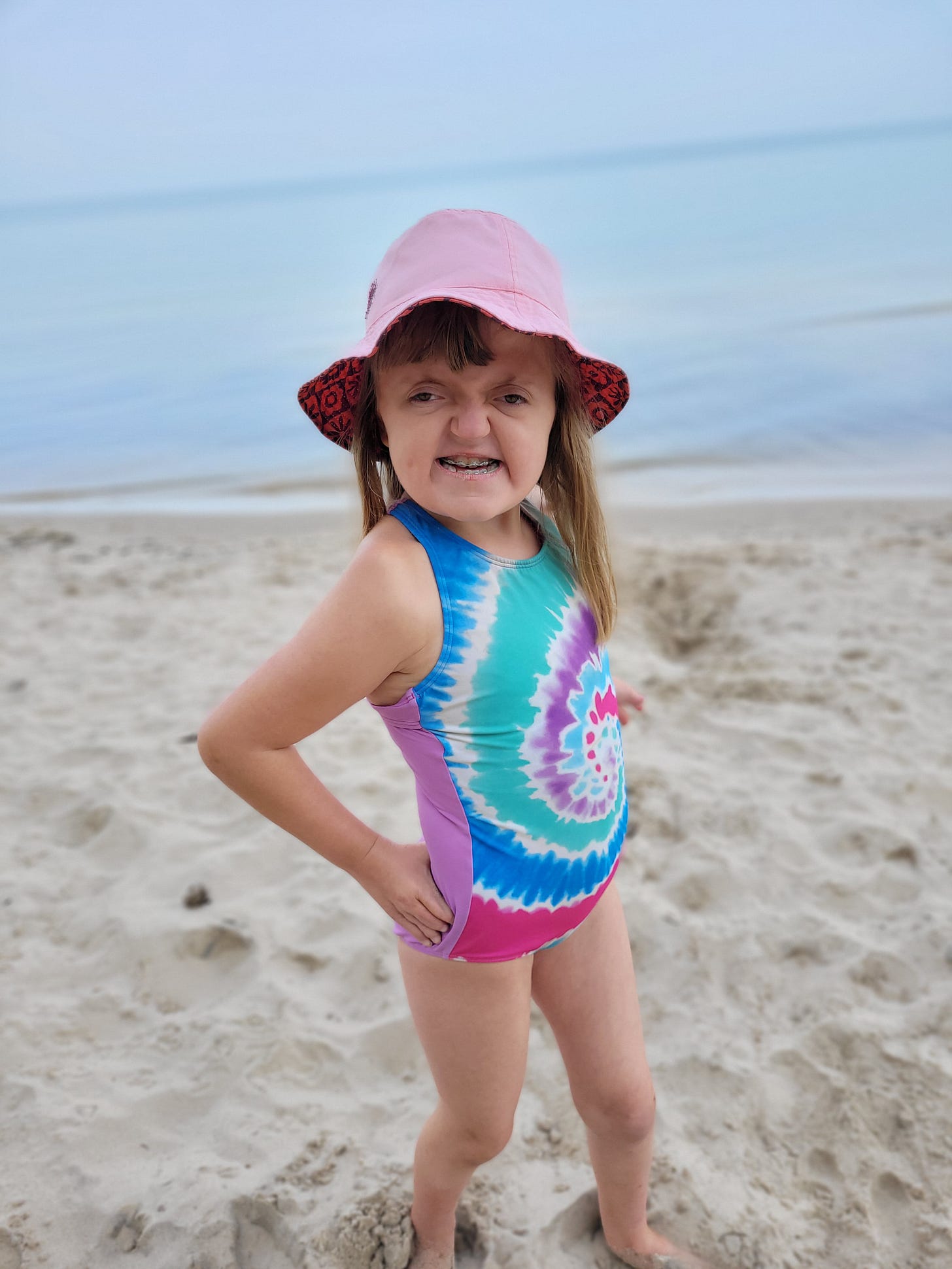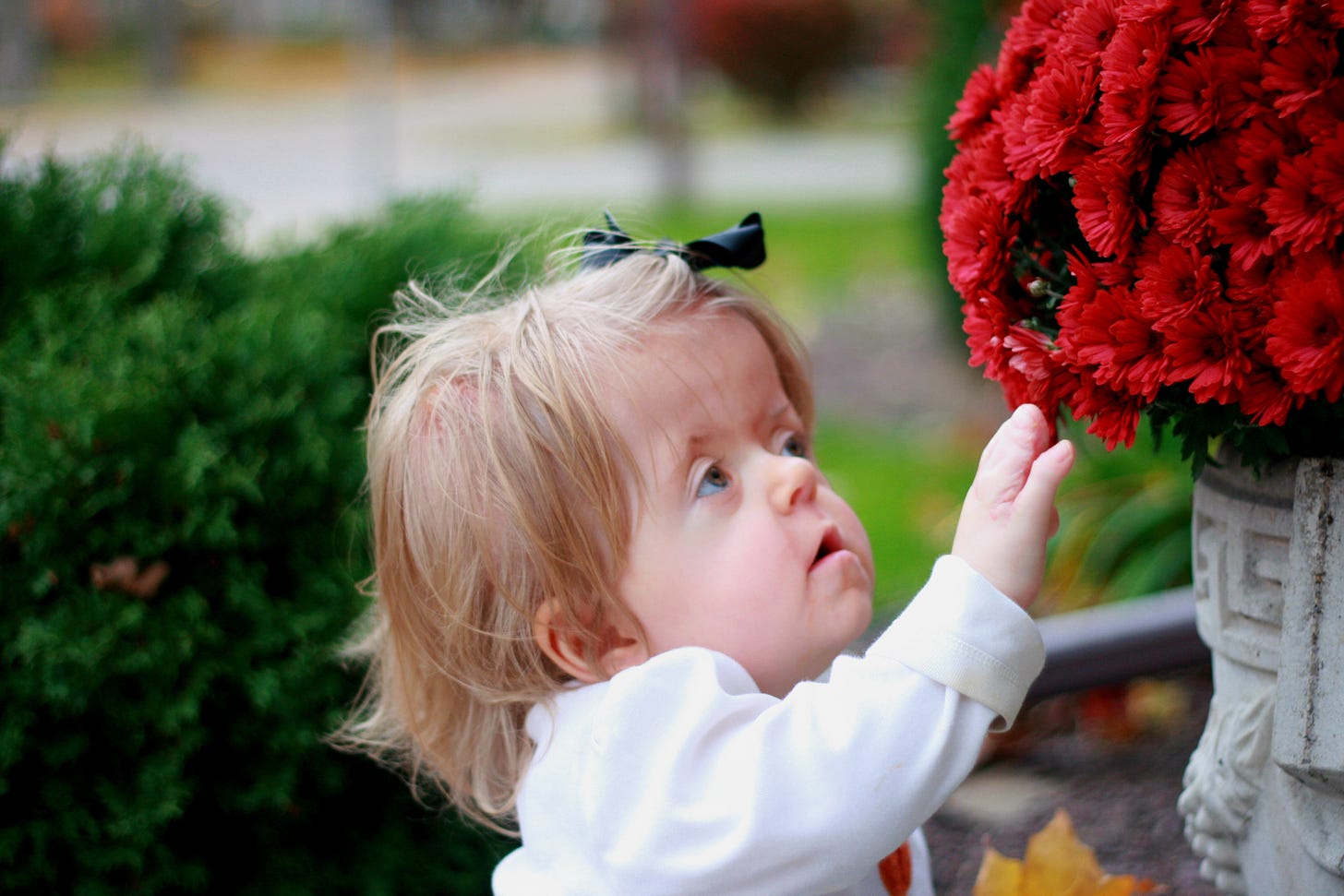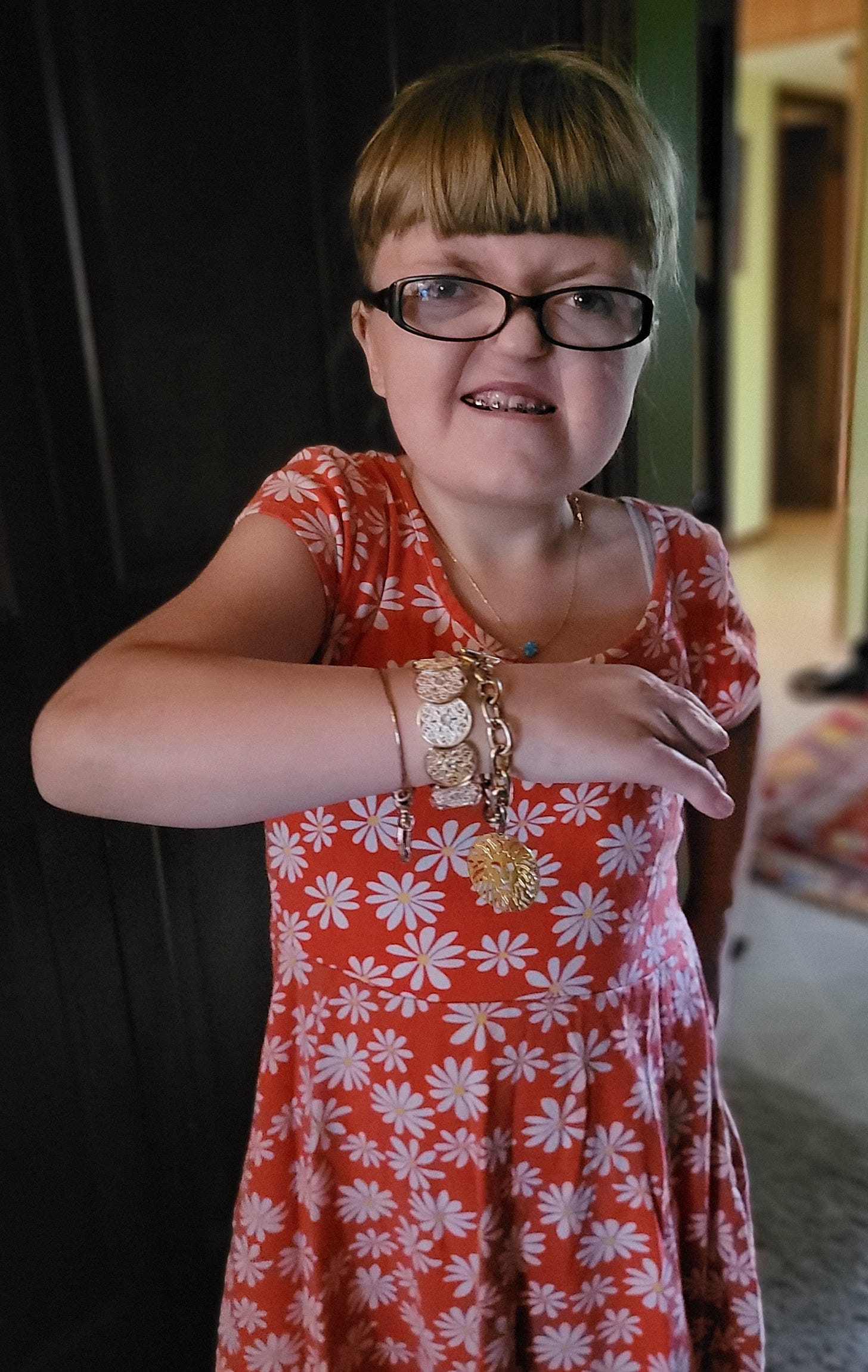'Pretty' isn't usually used to describe my daughter.
A child's compliment boosted Sarah's confidence.

Pretty is not a word typically used to describe someone with a craniofacial diagnosis. Usually, it’s the opposite: witch, ugly, monster. Sarah has heard all of these a handful of times. But never pretty.
For the audio version of this essay, please click on the arrow here:
It was a Friday, and Sarah had been begging me all week to take her to Kohl’s, so she could use a gift card she earned with reward points from her orthodontist. I finally capitulated. “Okay, Sarah, but we have to make it quick. I don’t have a lot of time.”
The thing is, there’s never enough time. For any of us. For any reason. I live by the clock and a sense of urgency that everything must be crammed into this day, because that means that someday, I’ll be able to relax. I’m old enough to know it doesn’t work that way.
Sarah bounded down the driveway and into the van. “Can I go, too?” Veronica chirped, and I shrugged, weary from the strand of appointments and back-to-school preparations. “Sure, V. But you don’t have your fun money today, so you’re just going for fun, okay?” She nodded.
As soon as I pulled out of the driveway, fat droplets of rain pelted the windshield. I thought, Good thing I had the girls put on their raincoats. All day, the air was thick with moisture, the clouds overhead gathering into a formidable black canopy above us. It was the kind of afternoon in which I wanted to nestle under my comforter with my current summer read (a novel, no less, and I haven’t read fiction in four years). But I knew this was important for the girls to get out for a change of scenery. Maybe it would be good for me, too.
Sarah didn’t know what she wanted when we arrived at the store. We browsed clothes, but she scoffed. “I want jewelry!” she proclaimed, but I groaned inward. “Sarah, you have so much jewelry. If you buy more, you’ll have to get rid of something you already have.”
Her shoulders slumped. “Okay.” After a few minutes, we stumbled upon the costume jewelry, and she scoured every last piece before making her selection: a multi-toned metal bracelet adorned with daisies crafted in intricate detail. Relieved, we headed for the checkout lane.
My mind was elsewhere, as usual, when a girl slightly younger than Sarah—maybe nine or ten—popped out of nowhere and walked straight up to her. Uh oh, I thought. What’s happening? I felt panic rising in my chest, because my expectation was that the girl would ask an uncomfortable question, and I wasn’t in the mood to answer it. Mostly, that’s what happens with kids, and I moderate the interaction between them and Sarah.
We’re prepared for the surprise question from an innocent, curious kid, like, “Why do your hands (or feet) look like that?” At times, they’ll blurt, “What’s wrong with your face?” Sarah’s rehearsed how she wants to respond, and as the girl stood only inches from Sarah’s face, I stiffened. Sarah did, too.
“I think you’re pretty,” the girl said plainly, waiting for Sarah’s reply. Neither of us knew what to say. Veronica was in her own universe, fiddling with the stuffed animals displayed in the checkout lane. I side-eyed Sarah, who furrowed her brow. “Oh. Oohhhhkay,” she answered.
The girl’s cheeks flushed, and I rushed in to diffuse the awkwardness of this exchange. “Sarah, isn’t that sweet? She gave you a compliment. How thoughtful.” The girl wrapped her arms around Sarah for a hug, but Sarah didn’t know what to do. She froze and looked at me pleadingly.
“Tell her thank you,” I mouthed, and Sarah sputtered, “Th-thank you.” The girl released her embrace, made eye contact with Sarah, smiled, waved, and said, “Well, hope you have a great day!” Then she disappeared to the front of the line, where her mom was paying the cashier.
The girls and I stood silent for the duration of our time at the retailer. I didn’t know what to say, and I figured Sarah didn’t, either. When we braved the downpour awaiting us outside and settled into the van, shivering and soaked, I waited to put the keys into the ignition.
“I know that was an unusual thing that little girl said to you in the store, but it was kind. What did you think about it?” Sarah was sitting in the passenger’s seat upfront, so I turned to face her. She squinted and pursed her lips before responding. “I don’t know. It felt weird.”
I nodded, starting the engine and pulling out of the parking lot. “Yeah. That doesn’t happen every day, does it? Were you expecting her to say something else?”
Sarah, apparently bewildered, told me, “No…Yeah…I guess. I mean, I don’t really know. Just not that.”
Summertime is hard on Sarah, because she wears slides that reveal her conjoined toes. She’s outside more often, and we venture to public places when everyone else is also absorbing the scant months of northern Indiana sunshine. That makes her more vulnerable, a target to children’s cruel comments and snide stares.
Within the few weeks preceding this girl’s unexpected gesture of kindness, Sarah had experienced several older kids gawking at her while she was playing on the shores of Lake Michigan during a weekend family trip. Another girl sitting a few pews in front of us at church turned around to gape at Sarah throughout the entire hour of the liturgy within the same time frame.

I understood that Sarah might be on edge because of these incidents, and she tends to sidle up to me, holding me close when we are swimming at the splash pad or sauntering through the botanical gardens. But this was shocking. I searched my memory for any other times throughout Sarah’s eleven years when this had happened before, when a kid deliberately approached her to say they thought she was pretty.
Pretty is not a word typically used to describe someone with a craniofacial diagnosis. Usually, it’s the opposite: witch, ugly, monster. Sarah has heard all of these a handful of times. But never pretty. This was the first time it had happened, and neither of us knew what to do.
I wanted to follow the girl and tell her mom, “You have an incredible child. She complimented my daughter when kids her age tend to tease or taunt her.” I wanted to hug the little girl myself. I wanted us to linger for just three more seconds, so that I could tell the girl she was brave for taking that risk to someone she didn’t know, when she wasn’t sure how it would all turn out.
But the truth is, since Sarah’s birth, I’ve always prepared for the worst. Sure, adults have treated Sarah with compassion and patience. They focus on her personality, her strengths and talents rather than her appearance. But kids, of course, don’t have that social filter yet. They’re fascinated by what’s different, and they seek to understand why we’re not all the same.
When we returned home from our brief outing, Sarah put on her bracelet, posed with her hand on her hip, and asked, “Mom, would you take my picture?”
“Why?” I responded. “Do you want to show Grandma your new bracelet?”
“No,” she said, beaming. “Because I’m pretty!”
Maybe the little girl saw beyond Sarah’s face. Maybe she knew that beauty encompasses the totality of a human rather than their body shape or facial features. Maybe she suspected that Sarah had been teased before, and she wanted to bring a little sunshine and confidence to someone who had begun to fall in the shadows, succumbing to fear.
And maybe, just maybe, she really did think Sarah was pretty just the way she is.
I grinned. “Sure, Sarah, let’s take that picture.”
If you enjoyed reading this essay, you might also like these previous posts:
Our Commonality is the Language of Love: I wrote about our family’s experience taking Sarah to a national craniofacial family conference and retreat last summer, so that she could “meet other people who look like me.”
Hard Things Aren’t Always Bad Things: Here, I share an ordinary moment with Sarah, where she asked me if the hard things in life were bad. I turned my response into a life lesson for us all.
The World Can Be Ugly, But You Are Not: This is an essay inspired by an exchange between our former summer nanny (and family friend) Alayna, after someone at the splash pad called Sarah ugly.






Sarah IS pretty. I loved hearing this story. Thank you. It's so hard when we live in a culture where people can be so insensitive. I remember in China, one of my students told me I wasn't pretty like the movie stars they'd seen, but I was "pretty of the heart."
I love this article. Thank you, and I pray God will continue to give Sarah and you a sense of being treasured and pretty. My cousin's daughter was born with fairly severe craniofacial issues...and she has gone through so many surgeries. She's now a young adult, living independently.
Wow, I really love how you framed the situation for your daughter. You narrated what was happening to help her understand, but also opened space for her to talk about it and process it. That little girl was so sweet, and I think YOU helped it have such a positive impact! Great job mama